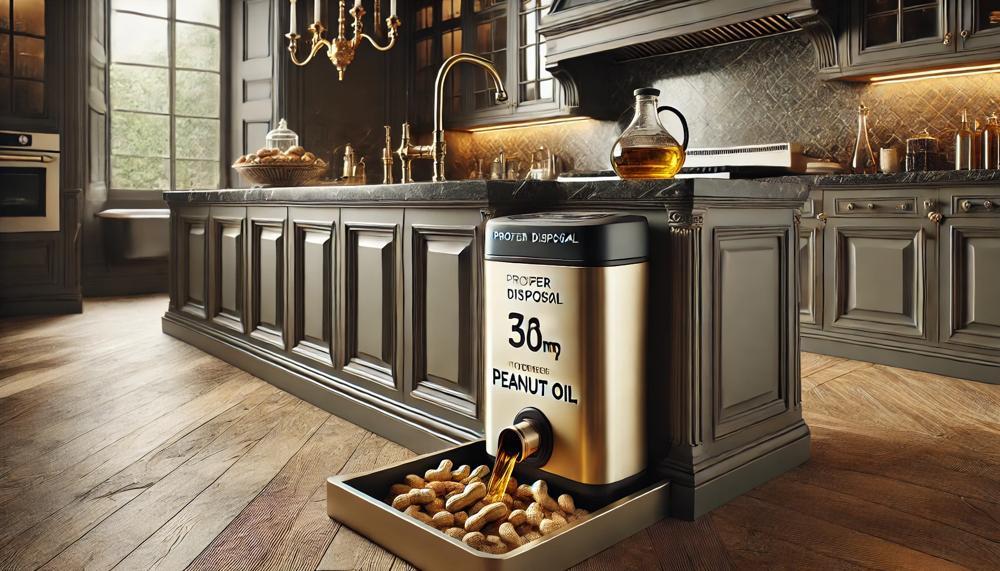Disposing of peanut oil correctly is crucial for both the environment and your home’s plumbing. Here’s a straightforward guide to help you handle used peanut oil safely:
- Reuse: Let the oil cool, strain it through a sieve, and store it in a glass jar or bottle. You can reuse it up to five times, but remember to strain it each time.
- Compost: If the oil was used for vegetarian food, you can add it to your compost pile.
- Trash: If reusing or composting isn’t an option, pour the cooled oil into a plastic or glass bottle and dispose of it in the recyclable trash bin.
- Large Quantities: For significant amounts, freeze the oil and donate it to biofuel companies or take it to a designated drop-off center.
Remember, never pour cooking oil down the drain—it can lead to clogs and pipe damage. By following these tips, you can ensure your peanut oil is disposed of responsibly.
Contents
Disposing of Peanut Oil by Reusing
Peanut oil can be reused effectively in several ways before disposal to minimise waste and environmental impact. Follow these practical methods to make the most out of your used peanut oil:
Reusing for Cooking
- Strain the Oil: After cooking, let the oil cool, then strain it through a cheesecloth or coffee filter to remove food particles.
- Storage: Store the strained oil in a clean, airtight container and place it in a cool, dark location. This prevents rancidity and extends shelf life.
- Limit Usage: Reuse the oil for cooking up to 3-4 times. Repeated heating can degrade the oil and release harmful compounds.
- Monitor Quality: Keep an eye on the oil’s colour and smell. If it darkens or develops a foul odour, it’s time to dispose of it.
Non-Cooking Uses
- Lubricant: Use peanut oil as a natural lubricant for squeaky hinges or other metal parts.
- Wood Polish: Apply the oil to wooden furniture to polish and protect the wood.
- Skin Moisturizer: Peanut oil, rich in vitamin E and anti-inflammatory properties, can be used as a skin moisturizer. Massage a small amount onto the skin for hydration.
Disposing of Peanut Oil by Composting
Composting peanut oil involves a specific process to ensure its efficient breakdown and integration into compost. Here’s a detailed look at the process and the benefits:
Composting Process
Prepare the Compost Pile:
Start with a well-balanced compost pile, including green materials (nitrogen-rich) like fruit scraps, vegetable peels, and grass clippings, and brown materials (carbon-rich) like leaves, straw, and shredded newspaper.
Adding Peanut Oil:
- Add the peanut oil in moderation to avoid overwhelming the pile. Excessive oil can create anaerobic conditions, slowing down the decomposition process.
- Mix the oil thoroughly with brown materials. Peanut shells, which are carbon-rich, can be particularly effective when combined with the oil.
Layering:
- Layer the compost pile, alternating between green and brown materials. Add a thin layer of peanut oil and mix well with brown materials to ensure even distribution.
Turning the Pile:
- Regularly turn the compost pile to aerate it and promote the breakdown of organic matter. This helps prevent the compost from becoming too oily and encourages the growth of beneficial microorganisms.
Monitoring Moisture:
- Keep the compost pile moist but not waterlogged. Peanut oil can create a hydrophobic barrier, so it’s essential to balance the moisture levels by adding water as needed.
Decomposition Time:
- Allow the compost to decompose for several months. The time can vary depending on the volume of oil and the efficiency of your composting practices.
Benefits of Composting Peanut Oil
- Reduces Waste: Composting peanut oil diverts waste from landfills, reducing overall waste production.
- Enhances Soil Quality: The compost enriched with peanut oil can improve soil structure, water retention, and nutrient content, leading to healthier plants.
- Environmental Benefits: Composting helps lower methane emissions from landfills and reduces the need for chemical fertilizers.
- Sustainable Disposal: Provides an eco-friendly alternative to disposing of used cooking oil, promoting sustainability in household waste management.
Practical Tips
- Balance is Key: Always balance the oil with plenty of brown materials to avoid creating an anaerobic environment.
- Small Amounts: Add peanut oil in small amounts to prevent potential issues with compost pile management.
- Local Facilities: Check if local commercial composting facilities accept peanut oil and consider using their services if available.
Disposing of by Giving Away
Properly giving away or donating unused peanut oil is not only an environmentally-friendly choice but also a practical way to help others. Here are detailed steps to ensure your peanut oil is disposed of correctly:
Cool and Store the Oil
- Let the peanut oil cool completely after use.
- Strain it to remove food particles using a fine mesh strainer or cheesecloth.
- Pour the strained oil into a clean, sealable container such as a glass jar or a plastic bottle.
Identify Potential Recipients
- Friends and Family: Ask if anyone you know can use the oil for cooking or other purposes.
- Local Restaurants: Some small restaurants or food vendors might be willing to take your clean, unused oil.
- Community Centers or Shelters: These organisations often accept donations for their meal programs.
Contact Biofuel Companies
- Many companies recycle cooking oils to produce biofuel. Contact local biofuel companies to see if they accept peanut oil donations.
- Provide details about the oil, such as the quantity and any previous uses.
Local Recycling Programs
- Check if your municipality has a cooking oil recycling program. These programs often accept used cooking oil to convert into biodiesel or other products.
- Visit your local waste management or recycling centre’s website for guidelines on how to donate your oil.
Online Platforms and Apps
- Use online community groups or apps like Freecycle or Nextdoor to offer your unused peanut oil to those who might need it.
Prepare the Oil for Donation
- Ensure the oil is in a sturdy, leak-proof container.
- Label the container with the type of oil and the date it was last used.
- Deliver the oil to the chosen recipient or drop-off location.
Disposing of by Throwing Away
Disposing of peanut oil by throwing it away involves careful handling to avoid environmental harm and adhere to proper waste management practices. Here’s a straightforward guide:

| Step | Action | Details |
| 1 | Let the Oil Cool | Allow it to reach room temperature. |
| 2 | Strain the Oil | Use a sieve or cheesecloth to filter out particles. |
| 3 | Choose Container | Select a plastic or glass bottle. |
| 4 | Add Absorbents | Mix with flour, cat litter, or sawdust. |
| 5 | Seal Container | Ensure the lid is tight to prevent leaks. |
| 6 | Dispose in General Waste | Place in the regular trash bin. |
| 7 | Use Drop-off Sites | Find local centres that accept used oil. |
| 8 | Avoid Plastic Bags | Do not use them to avoid spills. |
Disposing of Through Professionals
Key Reasons to Consider Professional Disposal
Environmental Protection
- Professionals ensure the oil is disposed of in an eco-friendly manner, preventing pollution and harm to wildlife.
- Proper disposal methods can help reduce soil and water contamination.
Compliance with Regulations
- Professionals are well-versed in local disposal regulations, ensuring compliance and avoiding potential fines.
- They follow best practices for hazardous waste management, which is crucial for businesses.
Convenience and Time-Saving
- Disposing of oil can be time-consuming and messy. Professionals handle everything, saving you time and effort.
- This service is especially beneficial for businesses like restaurants that produce large quantities of used oil.
Cost-Effective
- While hiring a professional incurs a fee, it can be cost-effective in the long run by preventing damage to plumbing and avoiding fines for improper disposal.
- Some services may offer recycling options, turning waste oil into biodiesel, which can be a sustainable energy source.
Safety
- Handling large quantities of hot oil can be dangerous. Professionals have the right equipment and expertise to manage it safely.
- Proper disposal prevents the risk of fires or injuries associated with incorrect handling.
Professional Disposal Services
| Service Provider | Features | Contact |
| Green Oil Recycling | Eco-friendly disposal, compliance with regulations, safe handling | Green Oil Recycling |
| EcoWaste Solutions | Cost-effective, time-saving, hazardous waste management | EcoWaste Solutions |
| Safe Oil Disposal | Recycling options, environmental protection, professional service | Safe Oil Disposal |
Disposing of Expired or Spoilt Peanut Oil
Disposing of expired or spoilt peanut oil in a safe and environmentally friendly manner involves several crucial steps:
Proper Steps for Disposing of Expired or Spoilt Peanut Oil
| Step | Action | Notes |
| Reuse | Filter and store for future use | Up to five times |
| Composting | Add small amounts to compost | For vegetarian food oils only |
| Donation | Give to biofuel companies | Or individuals who can reuse it |
| Proper Disposal | Collect in a sealable container | Take to drop-off centers or hire professionals |
| Do Not Pour Down the Drain | Dispose responsibly | Avoid environmental harm |
Conclusion
Properly disposing of peanut oil is crucial for maintaining a healthy environment and safeguarding your plumbing. Here’s a succinct summary of effective methods for disposing of used peanut oil responsibly:
First, consider reusing the oil. After cooking, let it cool, strain it through a sieve to remove food particles, and store it in a clean glass jar or bottle. You can reuse the oil up to five times if you strain it each time. Monitor the oil’s color and smell, and discard it if it becomes dark or develops an off odor.
For non-cooking uses, peanut oil can serve as a natural lubricant for squeaky hinges, a wood polish for furniture, or even a skin moisturizer due to its rich vitamin E content.
If reusing isn’t an option, composting is another eco-friendly method. Add the oil to your compost pile in moderation, mixing it with brown materials like leaves or peanut shells to ensure even distribution and prevent the pile from becoming too oily.
For larger quantities, freeze the oil and donate it to biofuel companies or take it to a designated drop-off center. This not only ensures proper disposal but also supports renewable energy initiatives.
Avoid pouring peanut oil down the drain to prevent clogs and damage to your plumbing.





